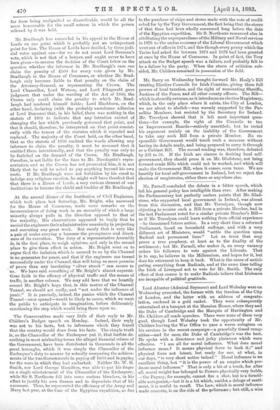At the annual dinner of the Institution of Civil Engineers,
which took place last Saturday, Mr. Bright, who answered for the House of Commons, made some remarks on the inconveniences of doing work in an assembly of which a large minority always pulls in the direction opposed to that of the majority. His observations appeared to imply that he envied the engineers their administrative unanimity in projecting and executing any great work. But surely that is very like a pair of scales envying a hammer the promptness and direct- ness of its execution. The daty of a representative Assembly is, in the first place, to weigh opinions, and only in the second place to give them effect in action. Mr. Bright went on to argue that the isolation which is secured to us by the Channel is no guarantee for peace, and that if the engineers can tunnel successfully under the Channel, that will bring us more promise of peace than any insulating " silver streak " can secure to us. We have said something of Mr. Bright's almost supersti- tions faith in the efficacy of physical traffic and the means of traffic, in another column. We may add here that we heartily second Mr. Bright's hope that, in this matter of the Channel Tunnel, we should act coolly, and "not n-nder the influence of panic." It is precisely, indeed, the panics which the Channel Tunnel—once opened—would be likely to cause, which we want the public to anticipate in imagination, before deliberately sanctioning the step which would bring them upon us.


































 Previous page
Previous page